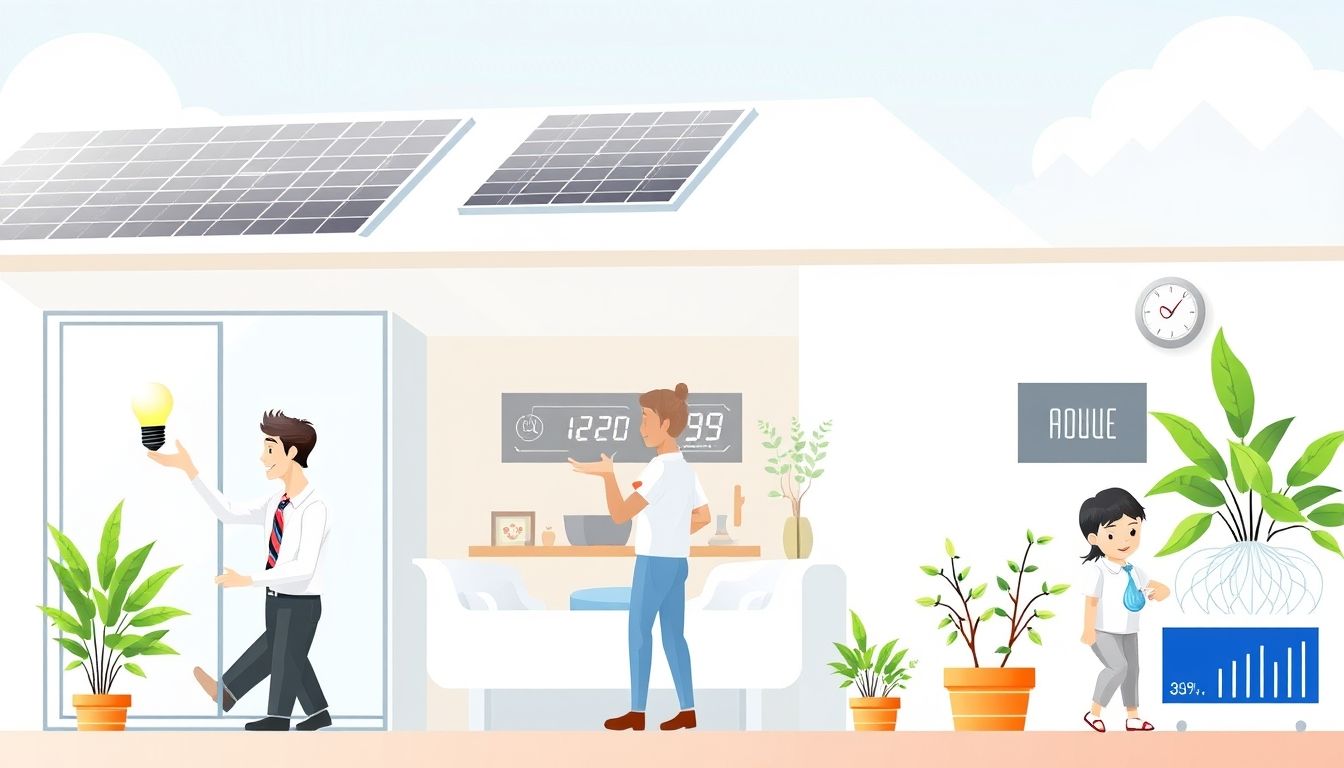Introduction: Why Should We Care About Saving Money on Bills?
In today's world, where economic challenges are increasing, controlling personal and family expenses is becoming crucial. Electricity, water, and phone bills, although considered necessities, can drain a significant portion of our monthly budget. Therefore, adopting effective strategies to save money on these bills is not just an option, but a necessity to achieve financial stability and save for the future.
Imagine being able to save 10% or even 20% of your monthly bill value. This amount can be directed towards achieving other goals, such as paying off debts, investing, or even enjoying a family vacation. In addition to the financial benefits, saving money on bills also contributes to preserving the environment and reducing the consumption of natural resources.
Chapter 1: Understanding Your Current Consumption: The First Step Towards Saving
Before starting to implement any strategy to save money, it is essential to understand your current consumption pattern. This requires a detailed analysis of previous bills and identifying the times when consumption is at its highest levels.
Analyzing Previous Bills
- Electricity Bills: Review your bills for at least the past six months. Note any sudden increases in consumption and try to identify the reasons. Did you run the air conditioner for longer periods? Did you use more electrical appliances?
- Water Bills: Look for any potential leaks in the house. Even small leaks can cause significant amounts of water to be wasted in the long run. Compare your bills in different seasons, as water consumption may increase in the summer due to irrigation.
- Phone Bills: Are you paying for services you don't use? Can you reduce the size of your internet or call package? Review your call and data history to identify the services you actually use and those you can do without.
Identifying Peak Consumption Times
Try to identify the times when your consumption of electricity, water, and phone is at its highest levels. Do you use most of the electricity in the evening when all the appliances are running? Do you consume most of the water in the morning when showering and washing dishes? Do you make most of your phone calls during the day?
Once you understand your consumption pattern, you can start identifying areas where you can make changes to reduce consumption and save money.
Chapter 2: Saving Electricity: Practical and Innovative Solutions
Electricity is one of the largest sources of spending in most homes. Fortunately, there are many effective ways to reduce electricity consumption and save money.
Replacing Traditional Bulbs with LED Bulbs
LED bulbs consume up to 75% less energy than traditional bulbs and last much longer. Although their price may be higher initially, they save money in the long run.
Example: If you replace 10 traditional bulbs with LED bulbs, you can save about $130 USD per year.
Using Energy-Efficient Electrical Appliances
When buying new electrical appliances, look for those that carry the "Energy Star" label or its equivalent in your country. These appliances are designed to consume less energy than traditional appliances.
Example: An energy-efficient washing machine can save up to 30% of water and electricity consumption compared to traditional washing machines.
Unplugging Electrical Appliances When Not in Use
Even when electrical appliances are in the off position, they still consume a small amount of electricity. Therefore, it is best to unplug them completely from the electricity when not in use.
Example: Unplugging your mobile phone charger, TV, and laptop when not in use can save about $25 USD per year.
Taking Advantage of Natural Sunlight
Try to take advantage of natural sunlight as much as possible. Open curtains and windows during the day to reduce the need to use artificial lighting.
Additional Tips for Saving Electricity
- Use a programmable thermostat to automatically adjust the temperature of the house.
- Clean the air conditioner filters regularly to improve its efficiency.
- Use the dishwasher and washing machine only when they are full.
- Iron clothes in one go to avoid heating the iron repeatedly.
Chapter 3: Saving Water: Simple and Effective Strategies
Water is a precious resource that must be conserved. There are many simple and effective ways to reduce water consumption and save money.
Fixing Leaks
Leaks are the main cause of water waste in homes. Check all faucets, toilets, and pipes regularly and repair any leaks immediately.
Example: Repairing a simple leak in a faucet can save up to 264 gallons of water per month.
Installing Water-Saving Shower Heads and Toilets
Traditional shower heads and toilets consume large amounts of water. Replace them with water-saving models to significantly reduce consumption.
Example: A water-saving shower head can save up to 50% of water consumption during showering.
Reducing Shower Time
Try to reduce shower time as much as possible. Even a few minutes less can make a big difference in water consumption.
Collecting Rainwater
If you have a garden, you can collect rainwater to use for watering plants. This is a great way to save water and reduce reliance on municipal water.
Additional Tips for Saving Water
- Wash the car using a bucket instead of a hose.
- Water plants in the early morning or evening to avoid evaporation.
- Do not leave the tap running while brushing your teeth or shaving.
- Use the dishwasher and washing machine only when they are full.
Chapter 4: Saving Money on Phone and Internet Bills
In the modern age of communications, phone and internet bills have become an integral part of our monthly expenses. Fortunately, there are many ways to reduce these expenses and save money.
Reviewing and Reducing Internet Package
Are you paying for a higher internet speed than you need? Review your internet usage and determine if you can reduce the size of the package without affecting your experience.
Example: If you are paying for a speed of 100 Mbps, but you only use 50 Mbps, you can save money by reducing the size of the package.
Using Free Communication Apps
Instead of making traditional phone calls, use free communication apps like WhatsApp, Skype, and Viber to make calls and send messages over the internet.
Canceling Unnecessary Services
Are you paying for phone or internet services you don't use? Cancel any unnecessary services to save money.
Comparing Offers from Telecommunications Companies
Before renewing your contract with a telecommunications company, compare offers from other companies to get the best possible deal.
Additional Tips for Saving Money on Phone and Internet Bills
- Use public Wi-Fi instead of mobile data when possible.
- Download movies and TV shows in advance to watch them offline.
- Subscribe to bundled packages that combine phone, internet, and TV services to get discounts.
Chapter 5: Smart Devices and Energy Saving: The Future of Consumption Efficiency
Modern technology allows us to better control our consumption of energy and water, leading to saving money and preserving the environment.
Smart Thermostats
Smart thermostats learn your habits and automatically adjust the temperature of the house to reduce energy consumption. They can be controlled remotely via smartphone, allowing you to adjust the temperature even when you are away from home.
Smart Plugs
Smart plugs allow you to control electrical appliances remotely via smartphone. You can turn off appliances that consume energy in standby mode, or schedule them to turn on and off automatically.
Smart Water Sensors
Smart water sensors monitor water consumption in the home and detect potential leaks. They send alerts to your smartphone if there is a problem, allowing you to take immediate action to prevent water waste.
Smart Lighting Systems
Smart lighting systems allow you to control the lighting in the house remotely via smartphone. You can adjust the brightness of the lighting, change its color, or schedule it to turn on and off automatically.
Chapter 6: Regular Appliance Maintenance: Ensuring Efficiency and Saving Money
Regular maintenance of electrical and water appliances is essential to ensure their efficiency and avoid costly breakdowns. Regular maintenance can extend the life of appliances and save money in the long run.
Cleaning the Air Conditioner
Clean the air conditioner filters regularly to improve its efficiency and reduce energy consumption. Dirty filters can reduce airflow and increase energy consumption.
Checking the Water Heater
Check the water heater regularly to make sure it is working properly. Clean it of limescale to ensure its efficiency.
Checking the Pipes
Check the pipes regularly to detect any potential leaks. Repair any leaks immediately to prevent water waste.
Cleaning the Dishwasher and Washing Machine
Clean the dishwasher and washing machine regularly to remove any food or soap residue. This residue can reduce the efficiency of the appliances and increase energy and water consumption.
Chapter 7: Changing Daily Habits: Small Steps, Big Results
Changing daily habits can have a significant impact on our consumption of energy and water. Even small steps can make a big difference in our monthly bills.
Showering Instead of Filling the Bathtub
Filling the bathtub consumes a large amount of water. Showering instead can save a significant amount of water.
Turning Off the Lights When Leaving the Room
Make sure to turn off the lights when leaving the room. This is a simple habit that can save a significant amount of electricity in the long run.
Using Electrical Appliances During Off-Peak Hours
In some countries, electricity prices are cheaper during off-peak hours. Try to use electrical appliances such as the washing machine and dishwasher at these times to save money.
Washing Clothes in Full Loads
Wait until you have a sufficient amount of clothes before washing them. Washing clothes in small loads consumes more water and electricity.
Chapter 8: Investing in Renewable Energy: Sustainable and Profitable Solutions
Investing in renewable energy, such as solar energy, can be a sustainable and profitable solution to save money in the long run.
Installing Solar Panels
Installing solar panels on the roof of your house can significantly reduce your dependence on traditional electricity. In some cases, you can even sell the surplus electricity to the electricity company.
Using Solar Water Heaters
Solar water heaters use solar energy to heat water. They can save up to 80% of the cost of heating water.
Chapter 9: Government Support Programs: Take Advantage of Available Initiatives
Many governments offer support programs and initiatives to encourage individuals and companies to save energy and water. Take advantage of these programs to reduce the costs of investing in energy and water-saving appliances.
Solar Energy Grants
Some governments offer grants to cover part of the cost of installing solar panels.
Incentives for Purchasing Energy-Efficient Appliances
Some governments offer incentives to purchase energy-efficient appliances, such as washing machines, dishwashers, and refrigerators.
Chapter 10: Conclusion and Recommendations: Your Path to a Sustainable Financial Future
Saving money on electricity, water, and phone bills is not just a financial matter, but also a matter of responsibility towards the environment. By adopting the strategies and tips mentioned in this article, you can achieve tangible savings in your monthly bills and contribute to preserving natural resources.
Remember: Every small step makes a big difference. Start today and you will see the results soon.




